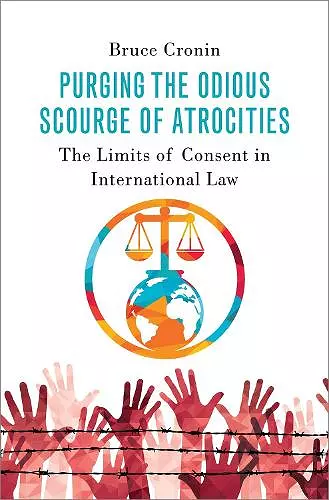Purging the Odious Scourge of Atrocities
The Limits of Consent in International Law
Format:Hardback
Publisher:Oxford University Press Inc
Published:7th Nov '23
£57.00
Supplier delay - available to order, but may take longer than usual.

Purging the Odious Scourge of Atrocities explains the growth of a small body of human rights law that bans the use of violence against a state's own population when it is deemed a mass atrocity. These laws are binding on all states regardless of whether they have accepted it by signing treaties, or whether it is consistent with widespread state practice. Yet, this challenges the doctrine of consent, which has traditionally been the foundation of international law. Bruce Cronin argues that qualitative changes in the form of global governance are leading to an expansion in the theoretical underpinnings of international law and its role in contemporary world politics. Specifically, in limited and well-defined areas of international law, states have begun to recognize the authority of collective international consensus over individual state consent as the source of some legal rules. Cronin supports this theory by examining the degree to which the international community has, via multilateral conferences among states, developed a consensus around the legal control of "excessive internal state violence"--that is, a level of coercive force that the international community considers to be disproportionate and illegitimate for pursuing state interests within its own borders. These practices, which the Genocide Convention refers to as an "odious scourge", include widespread, systematic attacks on civilian populations; violent persecution of defined groups (including genocide, ethnic cleansing, and apartheid); torture; and the violation of civilian immunity in internal armed conflicts. In these cases, state action is subject to general international law that overrides their consent. By allowing us to rethink the mechanisms that give international law actual force, Purging the Odious Scourge of Atrocities promises to reshape our understanding of why states are required to abide by human rights norms they never consented to by treaty or customary practice.
This book aims straight at the tangled heart of international law and politics. Obvious atrocities like mass killing and torture are excused by international law's commitment to state consent as the foundation for obligations. Cronin turns this on its head by drawing on history, law, and politics to show that new rules against atrocities have arisen through consensus rather than consent. The book is essential reading at the boundaries between law and politics, human rights and state power, and theory and practice. * Ian F. Hurd, Professor of Political Science, Northwestern University *
In this ambitious book, Bruce Cronin posits a new source of international law-collective international consensus-in arguing that mass atrocities are illegal, even when committed by states that are not bound by applicable treaty or customary law. Written in jargon free prose, anyone interested in how international law develops will be intrigued by this provocative and well substantiated thesis. * Ian Johnstone, Professor of International Law, Tufts University *
Should the international law on atrocities be based on established state practice, consent by states, or consensus through deliberation among jurists and practitioners? Cronin makes a fascinating argument for consensus, based on a theory of transformative moments in international society in terms of its prevailing types of units, the dynamic density of global interactions, and their degree of institutionalization. While some might see the present time as regressing toward sovereign nationalism, Cronin argues forcefully for a collective convergence of opinion on legal standards for atrocity crimes. * Jack Snyder, Robert and Renée Belfer Professor of International Relations, Columbia University *
ISBN: 9780197693308
Dimensions: 160mm x 231mm x 33mm
Weight: 476g
224 pages